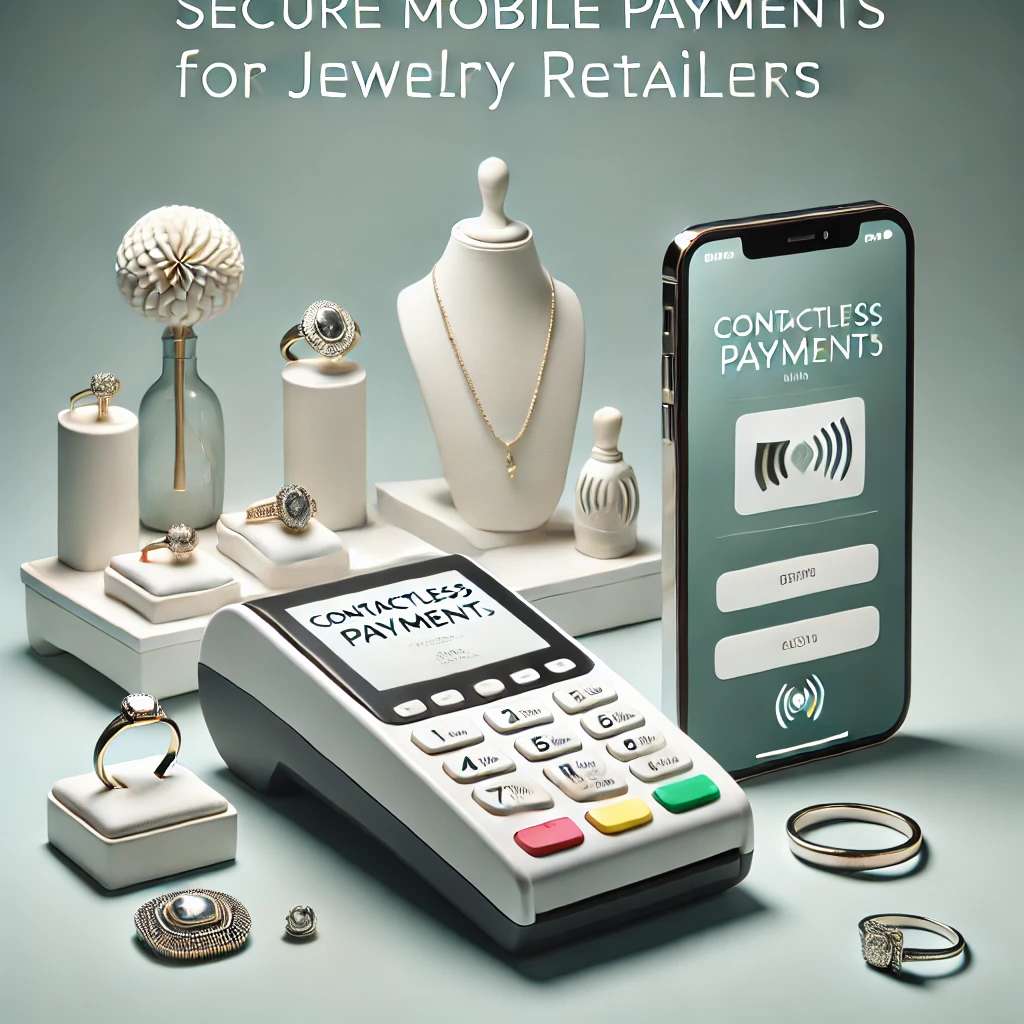AUTHOR: SONIA ROY
Introduction

In today’s fast-paced, tech-driven world, the way consumers shop for jewelry is evolving. More and more people are opting for online shopping[1], and the demand for convenient, secure, and fast payment options is growing rapidly. Mobile payment solutions have emerged as a key player in this transformation, providing jewelry retailers with innovative ways to manage transactions. Mobile payment processors[2] for jewelry retailers are essential tools that enable businesses to process payments efficiently and securely via smartphones and other mobile devices.
In this article, we will explore how mobile payment processors for jewelry retailers are reshaping the industry, the benefits they offer, and why they are crucial for businesses looking to stay competitive in the modern marketplace[3].
Understanding Mobile Payment Processors
A mobile payment processor is a technology that allows businesses[4] to accept payments via smartphones, tablets, or other mobile devices. Jewelry retailers, whether running online stores, brick-and-mortar shops, or both, are increasingly turning to mobile payment solutions to streamline transactions and enhance the shopping experience for their customers.
With mobile payment processors, customers can complete purchases using various methods such as credit and debit cards, digital wallets, and even peer-to-peer payment apps, all from the convenience of their mobile devices. These solutions are not only convenient but also provide a high level of security[5], crucial in high-value transactions such as those in the jewelry industry.
Why Jewelry Retailers Need Mobile Payment Processors
1. Enhanced Customer Convenience

One of the primary reasons for adopting mobile payment processors for jewelry retailers is the enhanced convenience they offer. Customers today expect fast, seamless, and hassle-free shopping experiences, particularly when purchasing expensive items like jewelry. By allowing payments via smartphones, mobile payment processors make it easy for customers to shop anytime, anywhere, without the need to physically carry cash or cards.
2. Improved Transaction Security
Security is a top priority in the jewelry industry due to the high value of transactions. Mobile payment processors for jewelry retailers are equipped with advanced security features such as encryption, tokenization, and biometric authentication to ensure that both businesses and customers are protected from fraud and unauthorized access. These technologies provide peace of mind for customers when making large purchases, fostering trust in the retailer.
3. Increased Sales and Impulse Purchases
Mobile payments can drive higher sales by facilitating quick transactions, reducing friction during checkout. Customers are more likely to make impulse purchases when the payment process is fast and easy. With mobile payment processors for jewelry retailers, customers can complete transactions in just a few taps, increasing the likelihood of conversions and repeat sales.
4. Global Reach
As the jewelry market becomes more global, retailers are looking for ways to reach customers from all corners of the world. Many mobile payment processors for jewelry retailers support multiple currencies, making it easy for businesses to accept payments from international customers without the complexities of currency conversion. This broadens the potential customer base and helps jewelry retailers tap into international markets.
Key Features of Mobile Payment Processors for Jewelry Retailers

1. Multiple Payment Methods
One of the key features of mobile payment processors for jewelry retailers is their support for multiple payment methods. Whether your customers prefer to pay with credit or debit cards, mobile wallets like Apple Pay or Google Pay, or even peer-to-peer payment apps like Venmo or PayPal, these processors ensure that all these options are readily available. The ability to accept a wide range of payment methods improves the customer experience and attracts a more diverse audience.
2. Seamless Integration with POS and E-commerce Platforms
Mobile payment processors are built to seamlessly connect with point-of-sale (POS) systems and online store platforms. Jewelry retailers can use the same mobile payment solution in their physical stores and online stores, ensuring consistency in payment processing. This seamless integration helps businesses manage transactions efficiently and keep track of sales and inventory in one place.
3. Real-Time Transaction Monitoring
Another important feature of mobile payment processors for jewelry retailers is real-time transaction monitoring. Retailers can track sales, monitor trends, and even detect fraud in real-time. With access to these insights, jewelry retailers can make data-driven decisions, optimize their sales strategies, and provide better customer service.
4. Customizable Payment Solutions
Different jewelry retailers have unique needs depending on their size, customer base, and sales channels. Mobile payment processors for jewelry retailers offer customizable solutions to fit these needs. Whether it’s offering installment payments for expensive jewelry pieces, setting up recurring payments, or incorporating loyalty programs, these solutions can be tailored to meet the specific requirements of each retailer.
Benefits of Using Mobile Payment Processors for Jewelry Retailers
1. Faster Checkouts and Reduced Cart Abandonment
With the rise of e-commerce, abandoned shopping carts have become a significant challenge for jewelry retailers. Complicated checkout procedures frequently result in abandoned sales and missed opportunities. By offering mobile payment processors for jewelry retailers, businesses can simplify the checkout process, making it faster and more convenient for customers to complete their purchases. This helps minimize cart abandonment and boosts the likelihood of completed purchases.

2. Lower Transaction Costs
Traditional payment processors often charge high transaction fees, which can eat into a retailer’s profits. Mobile payment processors typically offer lower transaction fees and more transparent pricing models. This helps jewelry retailers save money and improve their bottom line.
3. Flexibility for Customers
Mobile payment processors offer flexibility for customers, allowing them to choose how they want to pay. Whether they prefer to use their credit card, debit card, or mobile wallet, customers appreciate having options that suit their preferences. This flexibility encourages repeat business and customer loyalty.
4. Better Customer Insights
Mobile payment processors provide valuable data on customer behavior, including purchasing patterns, payment preferences, and product trends. Jewelry retailers can use this information to personalize marketing campaigns, optimize inventory management, and improve their product offerings.
Popular Mobile Payment Processors for Jewelry Retailers
There are several mobile payment processors that jewelry retailers can choose from. Here are some of the most popular options: Below are a few of the most widely used options:
1. Square

Square is a widely used mobile payment processor that offers an all-in-one solution for both in-store and online payments. It accepts multiple payment options, such as credit and debit cards, along with Apple Pay and Google Pay. Square’s easy-to-use interface and integration with e-commerce platforms make it a top choice for jewelry retailers.
2. PayPal Here
PayPal Here is a mobile payment solution that allows jewelry retailers to accept payments anywhere, whether online or in-store. With PayPal Here, businesses can accept credit card payments, PayPal, and even contactless payments like Apple Pay. It’s especially popular among small to medium-sized retailers due to its simplicity and low setup costs.
3. Stripe
Stripe is known for its versatility and customization options, making it an excellent choice for jewelry retailers with unique payment needs. It accommodates numerous payment methods and integrates effortlessly with different e-commerce platforms. Stripe also provides advanced security features to protect high-value transactions.
4. Shopify Payments
For jewelry retailers operating on Shopify, Shopify Payments offers an integrated mobile payment solution that simplifies the payment process for both in-store and online purchases. It supports various payment methods, including credit and debit cards, Apple Pay, and Google Pay, making it ideal for retailers looking for an easy solution within their Shopify store.
Conclusion
Mobile payment processors for jewelry retailers are transforming the way businesses process transactions, offering numerous benefits such as convenience, security, and flexibility. With these solutions, jewelry retailers can enhance the customer experience, reduce costs, and boost sales. As the industry continues to evolve, embracing mobile payment solutions is not just a smart move but a necessary one to stay competitive in the digital age. By choosing the right mobile payment processor, jewelry retailers can position themselves for long-term success and growth.
FAQ
1. What are mobile payment processors for jewelry retailers?
Mobile payment processors are platforms that enable jewelry retailers to accept payments via smartphones or mobile devices. These processors enable a variety of payment options, such as credit and debit cards, mobile wallets, and peer-to-peer apps.
2. Why should jewelry retailers use mobile payment processors?
Mobile payment processors enhance customer convenience, improve transaction security, and provide flexibility in payment options. They can also help reduce cart abandonment, increase sales, and streamline payment processing for jewelry retailers.
3. What payment methods do mobile payment processors support?
Mobile payment processors for jewelry retailers typically support credit and debit cards, mobile wallets like Apple Pay and Google Pay, peer-to-peer payment apps, and sometimes even cryptocurrency payments.
4. Are mobile payment processors secure for high-value jewelry transactions?
Yes, most mobile payment processors offer advanced security features such as encryption, tokenization, and biometric authentication, ensuring that high-value jewelry transactions are secure and protected from fraud.
5. Is it possible to integrate mobile payment processors with e-commerce platforms?
Yes, many mobile payment processors offer seamless integration with popular e-commerce platforms like Shopify, WooCommerce, and Magento, allowing jewelry retailers to manage both in-store and online payments efficiently.

